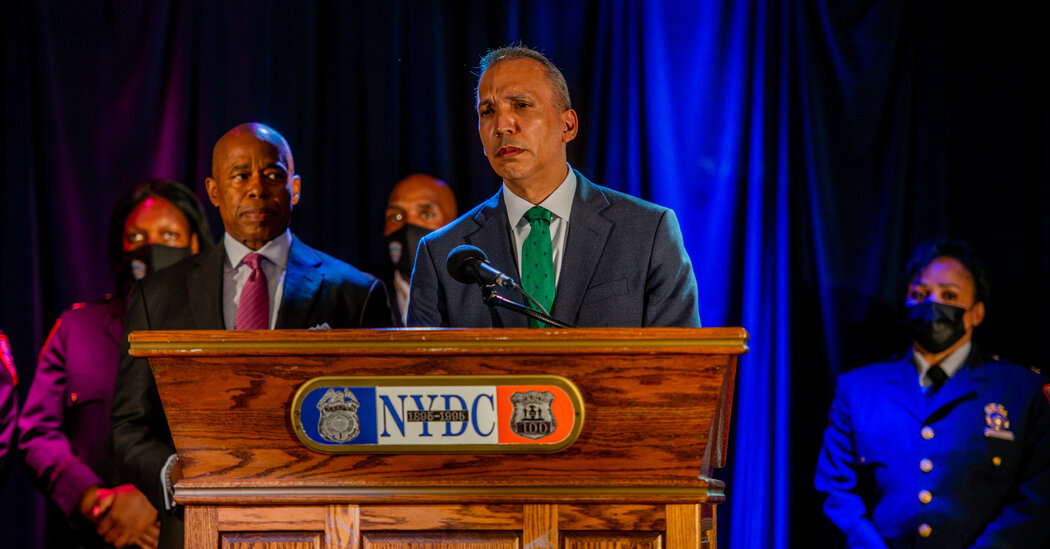
Jails Boss Pushed for Dying Man’s Release to Limit Rikers Death Count
After learning that a man held at the Rikers Island jail complex had suffered cardiac arrest and was on the brink of death, Louis A. Molina, the commissioner of the New York City Department of Correction, issued a directive to his subordinates.
“Make sure we do what we can,” Mr. Molina wrote on Thursday in an email obtained by The New York Times, to ensure the man was “off the Department’s count.”
Hours later, after the man, Elmore Robert Pondexter, was granted a so-called “compassionate release” from detention, he was taken off life support and died at Bellevue Hospital. Because he had been freed, the Correction Department did not count his death as having occurred in its custody, issuing no news release and providing no notice to the city Board of Correction, a jails oversight panel.
Mr. Molina does not have the authority to free people from custody on his own, and how much weight his directive carried in the ultimate decision to release Mr. Pondexter was not clear. But the direct involvement of the city’s top jail official appeared to show the lengths to which Mr. Molina was willing to go to keep the death figures down.
And although other jail officials have not counted deaths that occurred after ailing detainees were freed, Mr. Molina issued his instruction while under intense pressure to show improvements on Rikers Island — or risk a federal takeover of the city’s troubled jail system.
Across the United States, many criminal justice systems make a practice of occasionally releasing people who are elderly, incapacitated or gravely ill, and lawyers for those incarcerated in New York City jails often seek compassionate release on behalf of ailing clients.
Indeed, after Mr. Pondexter, 59, was stricken on Rikers Island last week, his attorney pressed for him to be freed so that he could die surrounded by family. Only after his death did those family members realize that the practice could be used to avoid accountability.
“At first we were happy he died with dignity, and we knew he wouldn’t die a prisoner,” said Aquandra Morris, 43, one of Mr. Pondexter’s three children. “But, then I thought about it — something is not right. They are trying to relinquish their responsibility.”
In a statement on Monday, a Correction Department spokeswoman said the department extends its “deepest condolences” to Mr. Pondexter’s loved ones.
“The Department strongly supports compassionate release because it allows for family members to spend time with the individual when they need the most care and support and without Department interference,” the spokeswoman said, adding: “The Department, of course, cannot grant compassionate release, the courts make the ultimate decision.”
Over the past two years, as the city’s jail system has reeled from a staffing crisis that caused breakdowns in the basic supervision and care of detainees, it has been harshly criticized for its seeming inability to safeguard jail workers and detainees alike. As a federal judge in recent months has weighed whether to appoint an outside official to oversee the jails, the number of deaths in the system has been an important metric.
Aside from Mr. Pondexter, the Correction Department under Mayor Eric Adams’s administration has freed at least one other incarcerated person before he died — Antonio Bradley, 28, who had tried to hang himself in June while unsupervised in a pen at the Bronx courthouse.
Mr. Bradley’s death, too, went unrecorded in the Correction Department’s official count of in-custody deaths. Sixteen people have died this year after being held in the city jail system, as many as died in all of 2021.
Incarcerated people have also been released after suffering serious injuries, including under former Mayor Bill de Blasio’s administration. In March, The Times reported that Mr. de Blasio’s Correction Department had freed two men who were grievously injured in separate jail house fights. One was paralyzed from the neck down and the other spent six weeks in a coma, and neither man’s injury was properly documented in jail records.
On at least one other occasion in the past year, Mr. Molina stepped in personally to advocate for releasing an incarcerated man after the detainee fell seriously ill while in the Correction Department’s custody.
Walter Turner, 42, had been held on Rikers Island on gun and drug charges for about a week when he began complaining of severe stomach pain in late April. Given only Tylenol by jail medical staff, he visited the jail clinic about six days later, and a doctor noted that his heart rate was elevated and his stomach was swollen and tender, according to jail records and Mr. Turner’s mother, Roslyn Greene-Turner. He was taken to Elmhurst Hospital that evening, where testing showed he was septic and in need of immediate surgery.
On the operating table, Mr. Turner went into cardiac arrest and suffered a decrease in brain function, according to his lawyer, Patrick Watts, Ms. Greene-Turner and records obtained by The Times. After multiple surgeries, doctors concluded he would never regain “meaningful consciousness,” jail records show.
As Ms. Greene-Turner was still absorbing that news, Mr. Molina arrived at the hospital and promised to see the charges against Mr. Turner dropped and to “get him out of custody,” she said. But Ms. Greene-Turner initially refused, concerned it would mean the jail system would escape scrutiny for what she considered lapses in her son’s care — and that she would be saddled with the resulting medical bills.
Soon after, another city official reached out about granting Mr. Turner a compassionate release, she said, but again she declined. Only after she realized that Mr. Turner could not be transferred to a long-term care center while he was still incarcerated, and her family’s access to him was restricted to allow not even a pastor to visit, did she relent, she said. She added that she believed the restrictions were meant to pressure her into giving her consent.
In June, Mr. Turner was transferred to a nursing facility in the Bronx.
“I wanted them to be accountable,” said Ms. Greene-Turner, 75. “They put him in the hospital.”
Unlike during past administrations, the Correction Department under Mr. Molina has taken a special interest in whether people in custody have fallen ill and might be at risk of dying, and thus are eligible for compassionate release, according to people familiar with the matter. Officials even check in periodically with medical staff for updates, the people said.
In the days before he was released, Mr. Pondexter, who had been held on Rikers Island since April 2020 on charges of rape and related offenses, complained to his sister and daughter that he was having chest pains and difficulty breathing, they said.
Mr. Pondexter, who had been housed in one of Rikers Island’s most heavily staffed intensive-care psychiatric housing areas, collapsed about 5 a.m. on Sept. 18, shortly after leaving his cell, according to jail records and two people with knowledge of the incident. A still image taken from a video shows Mr. Pondexter, clad in beige institutional clothing, sprawled on the gray tile floor at the base of a stairway.
At the hospital, tests revealed no urgent problems, one of the people said, but the next day, Mr. Pondexter went into cardiac arrest and, though his heartbeat was restored, he did not regain consciousness.
Days later, doctors determined he was brain dead, the people said. His lawyers with the Legal Aid Society began pressing for his release, and Brooklyn prosecutors and state parole officials — who had issued a violation hold — eventually consented to it.
Just before 11 a.m. on Thursday, Mr. Molina was made aware that the release could be delayed, department emails show. Mr. Molina responded by urging his staff to keep Mr. Pondexter off the department’s count.
Mr. Pondexter was taken off life support at Bellevue Hospital that afternoon. In a statement, the Legal Aid Society, the largest public defender organization in New York City, said the department’s actions and a lack of transparency supported the argument that the federal judge should appoint an independent official over the jails.
“Mayor Adams and Commissioner Molina have demonstrated that they will not or cannot keep people safe in the New York City jails,” the statement said. “We expect the department to be accountable for their actions in Mr. Pondexter’s final hours. To date, the department has failed to demonstrate accountability for the death toll, but instead rests in obfuscation and delay.”
In response to questions about Mr. Pondexter from the Board of Correction on Friday, Mr. Molina replied that the detainee was no longer in city custody, according to an email obtained by The Times.
“I have not been notified of his current health status as he is no longer under the Department’s custodial care,” Mr. Molina said.




